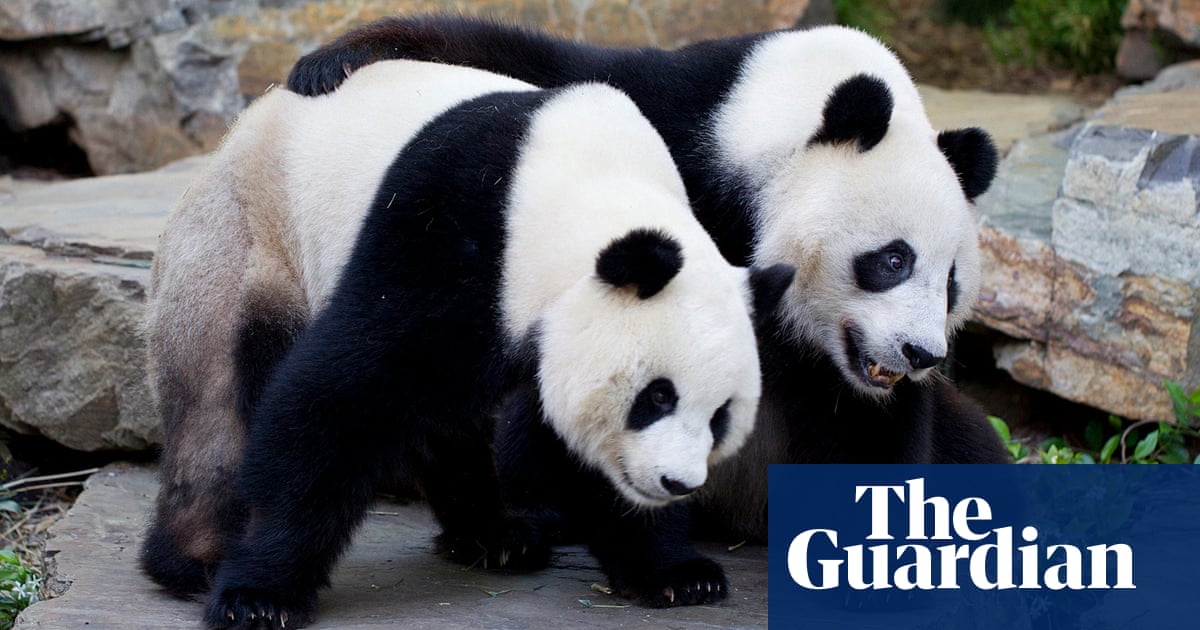
They might be cute and cuddly but Australia’s only giant pandas are in fact expensive – though nonverbal – Chinese diplomats.
The fate of Wang Wang and Fu Ni, who have called Adelaide zoo home for the last 15 years, will be decided on Wednesday after a meeting between Australian politicians and China’s foreign minister, Wang Yi.
The pandas arrived in Australia in 2009 after being relocated from China’s Wolong national nature reserve. It was the first time pandas had been held in Australia and the first time in the southern hemisphere.
The former PM John Howard was effusive in his praise for the China at the time: “It’s important when you’re talking about billions of dollars of resource contracts and you’re talking about tens of thousands of students, it’s also important to find in the relationship, the warmth and exhilaration that can come from the temporary residence of such lovely creatures.”
The initial 10-year loan was renewed in 2019 with funding from the South Australian government before relations with China soured under the Morrison government.
Kathleen Buckingham, a panda diplomacy expert from the University of Oxford, wrote that “sharing the care of such a precious animal strengthens the bonds that China has with its ‘inner circle’ of countries”. China has loaned 63 giant pandas to 19 countries, according to data from China’s National Forestry and Grassland Administration.
Sign up for Guardian Australia’s free morning and afternoon email newsletters for your daily news roundup
Panda diplomacy has existed since the Tang dynasty but pandas were given as gifts, rather than loaned, before 1984.
Dr Phil Ainsley, the director of Adelaide zoo, said while it was ultimately China’s decision, the zoo will do “absolutely everything it can” to keep Fu Ni and Wang Wang or to get different pandas on loan.
“The first time you actually get to see a giant panda in person, there’s absolutely something amazing about them,” he said. “The way you look into their eyes and they look at you is so captivating, and they are unlike any other animal to myself that I’ve come across.”
Fu Ni – who has won a silver medal for the most popular panda outside China – was named “lucky girl” in the hopes she would “fall in the net of love and have a baby”. But after nine attempts at breeding, including four attempts at artificial insemination, Fu Ni has not become pregnant and instead experienced multiple false pregnancies, which are virtually indistinguishable from normal pregnancies.
The fact that the pandas have continuously lived in Australia for the last 15 years is something of a feat, given escalating tensions.
The UK kept their pandas for 12 years before they were sent back in December 2023. China recalled nearly all pandas in the US in 2019, nearly 50 years after the first pandas were sent to the US in 1972, but announced in February that it plans to send two pandas to San Diego zoo this year.
While the pandas may be China’s version of an olive branch, they are an expensive one. A 14-hectare bamboo plantation, which grows 15 different species of bamboo, was set up to feed the pandas in South Australia, in addition to the loan payments of about $1m a year.
Ainsley said the giant pandas were “hugely popular”, with international tourists coming to Adelaide just to see the pandas. He said they also acted as an “ambassador” for other threatened species at Adelaide zoo.
The pandas are part of a international giant panda research, conservation and breeding program designed to protect the vulnerable population, with the zoo studying how pandas behave in the southern hemisphere.









